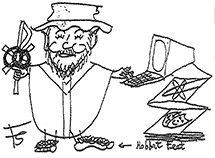”The Large Hadron Collider, the latest-generation subatomic-particle accelerator, goes online later this year…on the Franco-Swiss border.” So we are told by Richard Panek in his article “Out There” (New York Times Magazine, March 11, 2007). And if the attendant physicists - all over the world - do not find out something about “dark matter” - or even “dark energy”, they are going to be very disappointed, their world shrunk.
Many of us in our time like to think that there are answers to all questions, and if some questions are not capable of being answered, they should not be asked. But Einstein and others have said the greatest mystery is that we are here at all, and the next greatest is that we do get so many answers. So science tells answers to questions of How? Where? When? and leave the Why questions to art, music, religion - and lovers!
Just now, I am trying to think of the sadness that comes over us either when questions are unaswerable, or when it seems that the answer is likely to be NO! Suppose the answer to our anxieties about climate change, is that we cannot reverse the tragedies of drowning , death by earthquake, hurricane, tornado, , etc., which are promised by some of our prophets.
Our condition will be fear, anger, despair: mourning for our fate.
Christians go through a seasonal time of mourning - Lent. It represents not only Jesus in the wilderness, facing fear and the time of trial, but the Israelites forty years in the wilderness. And for the Christian, the end of that period is the passion - suffering - and death of Jesus, followed by Easter. Lent and Good Friday represent a deep mourning, expressed by Jesus himself from the cross, quoting Psalm 22:
“My God, my God, why hast Thou forsaken me?” and by the believer:
“O my people, my people, what have I done, have I done to thee? Answer me.”
Think of the mourning we have for the Holocaust: do we think of ourselves as victims, or as perpetrators? Are we enraged, or are we guilty? Gillian Rose “invites us to look away from both, and to see ourselves neither as victims nor as performers, but as suppliants.” (her book on “Judaism and Modernity,” quoted in Rowan Williams, “Lost Icons” page 130) Williams explores with Rose the meaning of remorse: “Rediscovering remorse has a lot to do with the capacity of a culture to leave room for the non-heroic, to celebrate the vulnerable and even the comic.”
So the Archbishop of Canterbury (Williams) dares to associate the “comic” with remorse. That should make a headline, if any one notices. But he is serious, and he is talking about a person’s capacity to face up to his or her own vulnerability in the face of monstrous social guilt. Within a redemptive community each of us is capable of asking for personal forgiveness, but also, necessarily, for an interchange of forgiveness in the whole human condition.
The Christian faith absolves guilt and brings reconciliation, and that means a change in our whole community, ultimately, the human race; in how we govern our connection with each other with love and honesty. As suppliants, we are asking God, who has begun the exchange in Jesus and the Cross, to open the paths before us, hitherto cluttered by our guilt, and to replace our mourning with joy and new life. The “comedy” is realized when we look back, laugh at our foolishness, and accept life like grown-ups.

